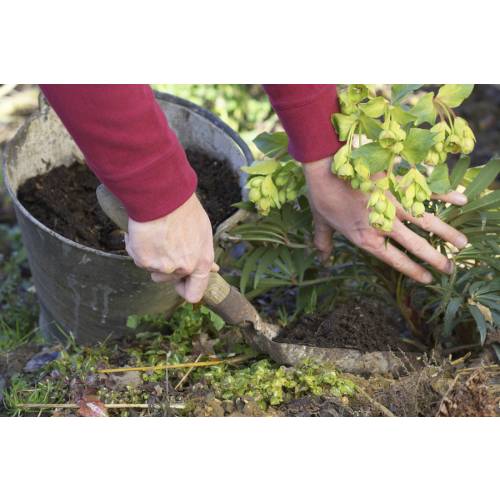
Nourish your plants
Choosing a fertilizer
- Details
-
A fertilizer is much more than a box or a bottle: It is a product that can be natural or not and can be used in different ways. Find the one that suits you best !
Chemical, organic or bio ?
Fertilizers have two possible origins: organic or chemical. Organic fertilizers are a natural product obtained from living matter: let us just say that they are varied. Animal or vegetal waste matter gives us a large choice of organic fertilizers. They need to decompose in the soil to feed the plants, even if sometimes this decomposition is rapid. Some organic fertilizers are sold in liquid form and decompose in a matter of days. Others need months before acting: they are called slow release fertilizer, as they dispense nutrients slowly but surely !
Organic fertilizers are used in bio agriculture. However, they are rarely bio: for this, one must prove that all the fertilizer components have been produced biologically, with methods used in bio agriculture. Most of the time, calling a fertilizer « bio » is clearly an abuse, except if the product is clearly labeled "AB".
One often speaks about natural fertilizers, which can be confusing. Proper natural fertilizers, such as Chilean nitrates or lithothamne, are extracted from special mines. They are non-renewable products and as such are non-durable.
Chemical fertilizers are made (from simple components and energy). They have, in theory, the same action on plants than the other fertilizers, except that they often act quicker, as they do not need to decay.
A liquid or solid fertilizer ?
Both have their advantages. Liquid fertilizers are easy to pour into a watering can but great care must be taken when diluting to get the right dose. Solid fertilizers do not need any preparation but they need to be dug in around the plants roots with a tool, such as a spade for example. They are a much more practical option on larger areas, as diluting fertilizer in a watering-can, can quickly become tedious !
There is not a "right dose"
To define in grams or in volume the dose needed for each plant is impossible! Indeed, fertilizers are more or less concentrated: so one must use more or less of it. Still the main worry is to determine whether your plants need fertilizer. A thorough analyze of your soil (for example using a soil analyzing kit or sending it for an analysis of its composition by mail) will give you a good idea of its needs. Also, take a good look at your plants: do they look like they are lacking in nutrients, do they look like they are not flowering as well or not growing as much as similar ones in your neighbourhood ?
Foliage fertilizer
Absorbs the fertilizer by the leaves: This is not a well know method! All that is needed is to strongly dilute a liquid fertilizer in a spraying can and to apply the fertilizer obtained via a fine spray or small drops on to the leaves of the plants that need it. The absorption is better and you do not waste as much product. Beware, if you make a mistake with diluting the dose, then scorching of the leaves will happen! Liquid organic fertilizers are not suitable for this application: only use liquid chemical fertilizers that are meant to be applied in this way, and it should only be undertaken by experienced gardeners. - Photos (2)


